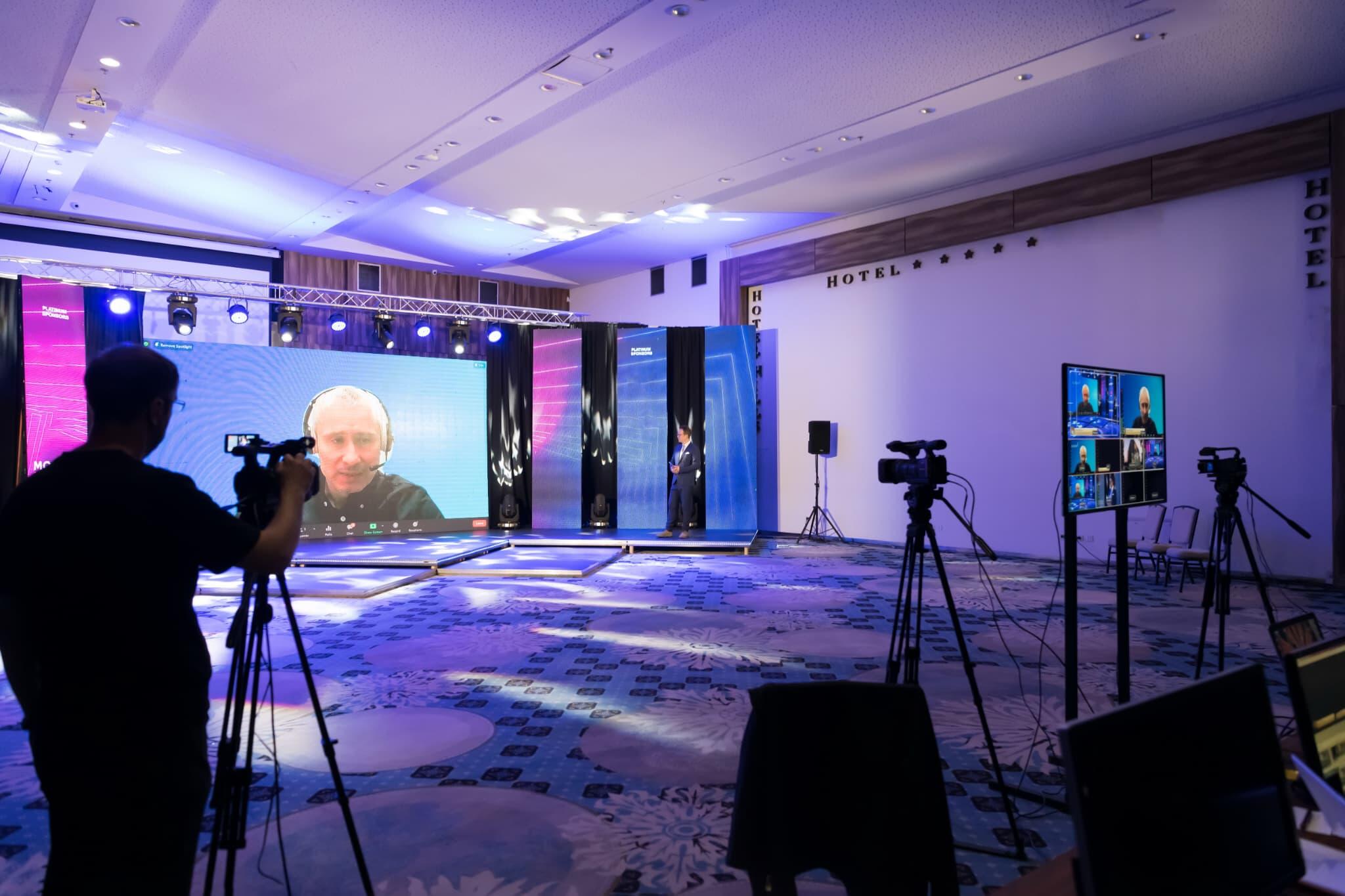Event marketing is a strategic approach where businesses create and host events—both physical and virtual—to promote their brand, products, or services. The primary objective is to engage the target audience, deliver memorable experiences, and foster direct interactions with potential customers.
Insights
A Guide for the Uninitiated Event Marketing
2024.10.18
- # Insights
- # Trade Shows
- # North/South Americas
- # Europe
- # Asia
- # Hawaii
- # Korea
- # China
- # Oceania
- # Micronesia

Events have been the cornerstone of promotions for businesses since long ago, whether a fledgling company is trying to get its foot in the door of an industry, or a long-established company is shining a spotlight on its latest product.
Here we will look at what event marketing is, what it can do for you, and how it can help you achieve your business goals. Whether it be small workshops, large-scale events, or anything in between, read on to see the advantages and benefits of event marketing.
What is Event Marketing?

Events, whether designed for product launches, brand activations, or industry conferences, provide a unique platform for businesses to communicate their message more effectively. By creating face-to-face interactions, companies can build stronger relationships, gain customer trust, and respond to queries or concerns in real time.
Additionally, events bring together industry professionals, partners, and influencers, facilitating networking opportunities that often lead to collaborations and new business partnerships. This direct engagement positions companies as industry leaders and enhances their brand reputation. When executed effectively, event marketing can generate significant impact that goes beyond traditional marketing channels.
Why Event Marketing is important
In a study conducted by the Event Marketing Institute, 74% of consumers reported that participating in branded event marketing experiences increases their chance of purchasing promoted products. This statistic emphasises the direct influence of events on brand loyalty and purchasing behaviour. Event Marketing enables businesses to establish instinctive connections with their audience by creating interactive and memorable experiences. Moreover, it improves brand visibility and fosters enduring customer relationships.
Events are the ideal opportunity to showcase your business or products directly to as many people as possible. Events can be critical turning points for a business. A product launch, for instance, can set the tone for how the market perceives a new offering. The outcome of an event can have a significant impact on a brand's image, revenue, and customer relationships. Because of this, businesses often treat important events as make-or-break opportunities, dedicating extensive resources to ensure success.
Benefits of Event Marketing

Event marketing offers a range of benefits that extend beyond other forms of marketing. By creating direct, personal, and memorable experiences, events enable businesses to engage with their audience, build lasting relationships, and drive growth. Event marketing is more direct and engaging than other forms of marketing and comes with a suite of benefits. Below are some key benefits that event marketing can provide to your business:
Brand exposure
Events are an ideal opportunity to increase brand awareness among as many potential customers as possible, especially your target audience. A strong brand image will help you stand out and leave a lasting impression on attendees. Consider the message you wish to convey and ensure it aligns with the desires of the clients and customers in attendance. By ensuring that your message aligns with the desires of the clients and customers, you're more likely to create lasting connections and foster loyalty. This alignment also increases the chances of achieving your event marketing goals, whether they are lead generation, brand awareness, or sales.
Lead generation

Lead generation is about identifying via research the customers or clients your brand or product should target at an event, nurturing interest among those consumers, and converting that interest into sales. A lead is any person with an interest in a company’s products or services.
Events are one of the most effective platforms for generating high-quality leads and fostering lasting business relationships. Events raise awareness of your business’s presence, thereby generating long lists of leads that then cascade into appointments and business opportunities. Leads acquired in this way can form the basis of solid, long-lasting relationships.
In-person engagement with clients and customers
An event brings opportunities for direct engagement with clients and customers in a manner that is seldom possible with other forms of marketing. In-person engagement in event marketing plays a pivotal role in building deeper connections with clients and customers, fostering trust, and creating memorable experiences that leave a lasting impact. Meeting clients and customers in person fosters a more personal and emotional connection. Engaging directly allows businesses to gather immediate feedback, helping to refine products and services based on customer preferences. Direct engagement can build a greater understanding, eventually leading to boosted sales and a healthier business.
Competitor research

Events also provide opportunities for gaining insight into what competitors are doing. Learning about similar brands and building relationships with them can be incredibly beneficial for your business. Building relationships with similar brands can lead to valuable insights, collaboration opportunities, and a stronger industry presence.By fostering a spirit of cooperation rather than competition, businesses can enhance their overall effectiveness and adapt more quickly to market changes.
Building relationships with similar brands can lead to valuable insights, collaboration opportunities, and a stronger industry presence. By fostering a spirit of cooperation rather than competition, businesses can enhance their overall effectiveness and adapt more quickly to market changes.
Types of Event Marketing

Event marketing has evolved significantly, it can take many forms, each offering unique opportunities to connect with audiences, enhance brand awareness, and drive sales. By choosing the right format for your goals and audience, you can maximise the effectiveness of your marketing efforts. The type of event you decide upon may depend on location, potential reach, budget, or the message you would like to convey to the public. Below are a few ways to engage with your audience through event marketing.
Conferences and Trade shows

Conferences and trade shows are a great way to showcase what your business can offer to your targeted industry and to the general public, and even lead to direct sales. Such events guarantee to not only bring in members of a target audience but also help to build new audiences. You can expand your client base by handing out flyers and business cards or compiling email lists. For smaller businesses, conferences and trade shows are a cost-effective means of marketing and help establish recognition of your product or enterprise among more established names in the industry. Conferences and trade shows can help you develop new business relationships and channels, and discover new markets or potential gaps.
Launch parties

Launch parties are a great marketing opportunity to generate hype and awareness. Such events may also directly lead to sales. A well-organised event can enhance customer engagement, foster community, and generate valuable media attention, all of which contribute to your brand’s overall success. To maximise the impact of your launch party, consider elements like inviting key influencers, providing engaging experiences, and utilising social media to amplify the reach.
Workshops

Workshops are easy to set up and a great way to interact directly with your customer base. Educational and creative, the direct and more hands-on style of a workshop can boost awareness and sales of a product among clients and customers. By focusing on education and interaction, you can foster a deeper connection with your customers and enhance your brand’s presence in the market.
Live streaming events

Video is the most popular form of content on the internet, making live streams an effective way to reach a mass audience. Instant reaction and engagement with the audience make it possible to gauge how people feel about your product in real-time. Utilising video as a marketing tool can significantly enhance audience engagement and strengthen your brand's presence. By being authentic, interactive, and strategic, you can create memorable experiences that resonate with your audience and drive your business goals.
Event Marketer Checklist
Should you be responsible as the organiser of showcasing a product or business at an event, there are certain essentials for ensuring that the event is successful. Here are some elements to add to your checklist. Each element is designed to ensure that your event not only runs smoothly but also leaves a lasting impression on attendees. From clear objectives to thorough follow-up, every step contributes to building relationships, generating leads, and ultimately driving business success.
Goals

Work out the goals you would like to achieve with the event. Is it bringing direct awareness to the product or brand, hitting a sales target, or is it for another purpose, like educating the general public? Setting the right goals will determine the type of event you will want to create and the types of reactions you will want to get from your audience. Before you begin organising an event, ask yourself why you are holding one in the first place, who the event is aimed at, how you will reach your goals, and what criteria make an event successful. By setting clear and measurable goals, you can design an event that effectively meets your objectives and creates a meaningful experience for your attendees.
Budget

Determine how much you plan to budget for the event. Depending on the type and size of the event, work out how much to allocate for each area. Budgeting will help with controlling spending and also help with budgeting for future events.
Target audience

Understanding your target audience is fundamental to the success of your event marketing strategy. Knowing the right target audience is crucial for aligning the brand or product you want to promote. Knowing the target audience will determine many factors: the type of event marketing, the location, small details like food and drink, and more. By deeply understanding your target audience, you can create an event that not only meets their needs but also exceeds their expectations, fostering loyalty and enhancing your brand’s reputation.
Marketing channels

To effectively promote your event, it’s essential to choose the right mix of marketing channels. Decide on what marketing channels you wish to use to promote your event as effectively as possible. Perhaps you should engage with social media or influencer marketing, email campaigns, advertising, or even non-digital strategies such as flyers or the radio. Engaging with a mix of both digital and non-digital marketing strategies can maximise your event's reach and effectiveness. Consider a landing page to direct people to more information about the event. A well-designed landing page is essential for capturing interest and driving registrations for your event.
Social media, advertising, and campaigns

With many people active on social media, such platforms can help you spread the word about your event far and wide. Build a community around your event, create social media posts, post event details, and interact with users to publicise to as many people as possible. Paid advertising may require more spending, but it guarantees that information about your event reaches your target audience. By effectively using social media, targeted advertising, and integrated campaigns, you can significantly enhance your event's visibility, drive attendance, and foster a vibrant community around your brand.
Metrics

Work out the information you will require to determine the success of the event. To determine the success of your event, it's essential to gather relevant information and set clear expectations using metrics or Key Performance Indicators (KPIs). Some ways of determining metrics include event registration, the number of actual attendees versus those who registered, ticket sales, the number of clicks from emails, social media engagement or mentions, and the number of returnees or new attendees. By focusing on these metrics, you can gain valuable insights into your event's performance and areas for improvement.
Post-event surveys

Getting feedback from attendees on their experience and insights through surveys after the event has finished will help improve any future event you hold. The line of questioning could inquire about how they learned of the event, what they enjoyed, and more. By implementing a structured feedback process, you can gather actionable insights that refine your event strategy, enhance attendee experiences, and ultimately drive greater success for future events. This proactive approach allows you to understand your audience better, make informed decisions, and continuously improve your offerings. Listening to attendee feedback not only demonstrates your commitment to their experience but also fosters loyalty and engagement, setting the stage for future participation.
Summary
Event marketing is crucial in promoting a product or business directly to the public. The kind of event and the steps taken to ensure the maximum benefit and engagement will ensure your product or enterprise can realise its full potential. By focusing on creating meaningful, interactive, and enjoyable experiences, you can enhance brand loyalty and advocacy. Every touchpoint, from pre-event marketing to post-event follow-ups, contributes to the overall success of your event marketing strategy.

We at JTB have assembled a dedicated trade show and event team organisation with a strong network of contacts in the Indian Event industry. If you need help planning or learning how to have a successful event, please feel free to contact us.
Insights
Learn More

